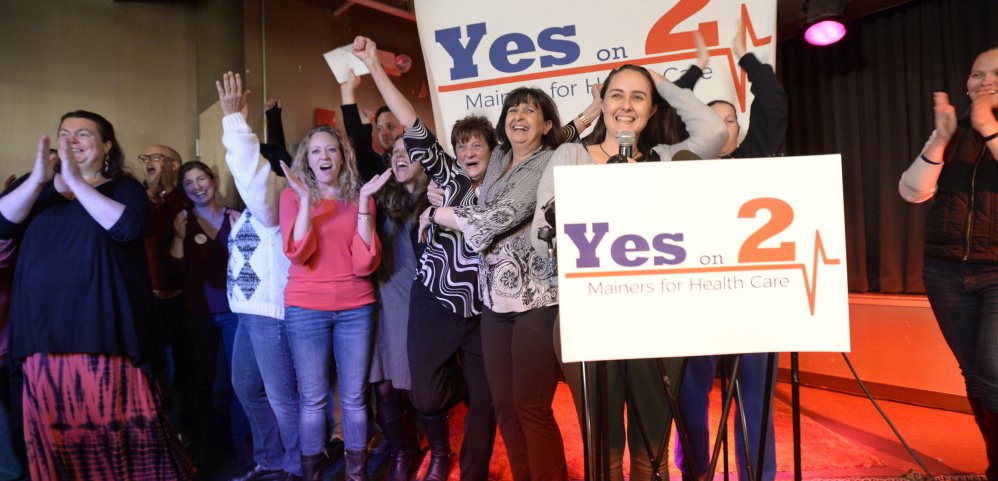Maine voters made me proud Tuesday.
First, they dispatched the referendum on a southern casino with extraordinary clarity. Five out of six voters said “no,” despite a $10 million advertising campaign seeking their support for the most deceptive campaign in decades.
More importantly, for the future of Maine’s economy and citizens, our voters made Maine the first state in the nation to expand Medicaid by popular vote.
This vote, apparently, has sent Gov. Paul LePage into a rage. How dare we veto him? Vetoing bills is his job. LePage is the veto king of Augusta, with more vetoes than any other Maine governor in history. Since he has no real ability to persuade the Legislature to support his ideas, he’s become “Gov. Veto,” blocking legislation, voter-approved bonds and now nearly all recent citizen initiatives.
It is almost as though he’s saying to Maine voters, “Who do you think you are?”
I would urge Gov. LePage and his allies in Augusta to step back and take a deep breath. Reflect on what Maine voters just said and the instructions they sent. Once the dust settles on this vote, calmer heads need to prevail.
Last Tuesday’s elections across the country, where Democrats picked up seats everywhere, are a warning of what is coming for Republicans in 2018. It could be the beginning of a tidal wave of angry voters determined to “throw the bums out” over frustration and embarrassment with the president and Congress.
That wave could also sweep Republicans out of any positions of power in Augusta next year. Republicans can avoid the worst of that prospect by not doing dumb things like foot-dragging on the public’s votes. If they meddle with the Medicaid vote, they will pay the price in every district in the state next year.
Here’s a little advice for the governor and Republicans in the Legislature on how initiatives work: Citizens initiate them, by their signatures. Elected officials are free to share their views and opinions and, if they wish, to campaign for or against a referendum. Then citizens vote and their will becomes law. Elected officials, including the governor, should then represent the voters, and, barring any major flaws in the bill, get out of the way.
LePage has, of course, opposed expanding Medicaid since it first became a possibility when the Affordable Care Act was passed. He also vetoed the Legislature on this issue five times. His arguments against expanding Medicaid have fallen into three categories:
First, that we can’t afford it, even though the federal government is picking up more than 90 percent of the tab. Second, that voters didn’t understand the issue and that referenda are a bad way to govern, even though LePage himself just a few years back proposed as many as five questions and promised to govern by the will of the people (He wasn’t able to secure the signatures to get any of them on the ballot).
Perhaps his bottom-line argument has been that Maine people are strongly opposed to the Affordable Care Act, which allows this expansion to occur, and that LePage and company were simply standing up for Mainers.
All of those arguments turned to dust Tuesday, in a Medicaid expansion vote that wasn’t close and wasn’t confusing.
Augusta has gotten into a bad habit, under LePage, of ignoring the will of the voters and either making major revisions to or outright dismissing citizen initiatives. They’ve done that, most notably, on the ranked-choice voting and marijuana initiatives.
This trend began when Le-Page, early in his administration, decided that bond issues passed by the voters didn’t matter unless he agreed with them. So he sat on bond issues, refusing to expend funds as required by the voters. And he got away with it, which then emboldened his Republican allies to treat citizen initiatives with the same indifference.
But messing with the vote on Medicaid expansion is another thing altogether, and it’s full of peril for Republicans.
Most Americans now support having more people insured. They’re coming to appreciate that when people don’t have health care, it actually costs the rest of us a fortune in shortened lives, lost productivity and costly crisis treatment in emergency rooms.
Something has shifted in the public’s attitudes on health care, and Republicans spend so much time talking to each other that they haven’t picked it up.
Alan Caron is an independent candidate for governor and a former columnist for this newspaper.
Send questions/comments to the editors.



Comments are no longer available on this story